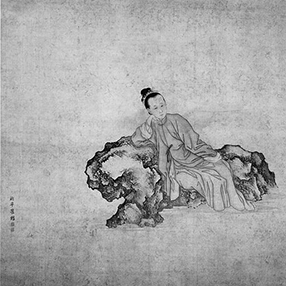The Wild Swans
translated from the French of Judith Gautier by James Whitall
Before daybreak the breezes whisper
through the trellis at my window;
they interrupt and carry off my dream,
and he of whom I dreamed
vanishes from me.
I climb upstairs
to look from the topmost window,
but with whom? . . .
I remember how I used to stir the fire
with my hairpin of jade
as I am doing now . . .
but the brasier holds nothing but ashes.
I turn to look at the mountain;
there is a thick mist,
a dismal rain,
and I gaze down at the wind-dappled river,
the river that flows past me forever
without bearing away my sorrow.
I have kept the rain of my tears
on the crape of my tunic;
with a gesture I fling these bitter drops
to the wild swans on the river,
that they may be my messengers.
Les Cygnes Sauvages
translated from the Chinese of Li Qingzhao by Judith Gautier
Le vent souffle, avant l’aube, au dehors, sur les treillis de ma fenêtre.
Il interrompt et emporte mon rêve, il efface tout vestige de lui.
Pour voir aux alentours, je monte à l’étage supérieur . . . avec qui? . . .
Autrefois, je me souviens, du bout de l’épingle en jade de ma coiffure, je remuais le feu,
Comme je le fais à présent . . . mais le brasero est éteint.
Je tourne la tête vers la montagne: la pluie, un épais brouillard.
Je regarde vers le fleuve, tout bossué de vagues; le fleuve qui coule toujours, devant moi, sans emporter ma peine.
Sur le crêpe de ma tunique, j’ai gardé la pluie de mes larmes;
D’une chiquenaude, je chasse ces gouttes amères vers les cygnes du fleuve, pour qu’ils soient mes messagers.
浪淘沙·帘外五更风
帘外五更风,
吹梦无踪。
画楼重上与谁同?
记得玉钗斜拨火,
宝篆成空。
回首紫金峰,
雨润烟浓。
一江春浪醉醒中。
留得罗襟前日泪,
弹与征鸿。
This poem is in the public domain. Published in Poem-a-Day on May 27, 2023, by the Academy of American Poets.
“The Wild Swans” appears in Chinese Lyrics from the Book of Jade (B. W. Huebsch, 1918), translated by James Whitall from the French of Judith Gautier’s Le livre de jade; poésies traduites du chinois (Félix Juven, 1902). Gautier’s translation is based on the classical Chinese of Song Dynasty poet Li Qingzhao, written sometime during her life between the years 1084 and circa 1155. Gautier, in Whitall’s English translation of the introduction to Le livre de jade included with Chinese Lyrics from the Book of Jade, writes that “[t]he incurable wound of [Li Qingzhao’s] heart, bleeding in solitude, is practically the only subject with which [Li Qingzhao] deals [. . .]. As far as can be known, the love that devours this Chinese Sappho is ignored by him who inspires it; possibly she has never even seen him, and she makes no effort to show herself or to attract him to her. The fact of her being a woman, customs and the conventions make it impossible. [. . .] In her verses [Li Qingzhao] always unites her grief with the sphere in which she lives, her encircling universe, or at least as much of it as she can see from her window. The changing seasons are the only events, the objects that adorn her home the only evidences of a life consecrated to the expression of a single sentiment.”

